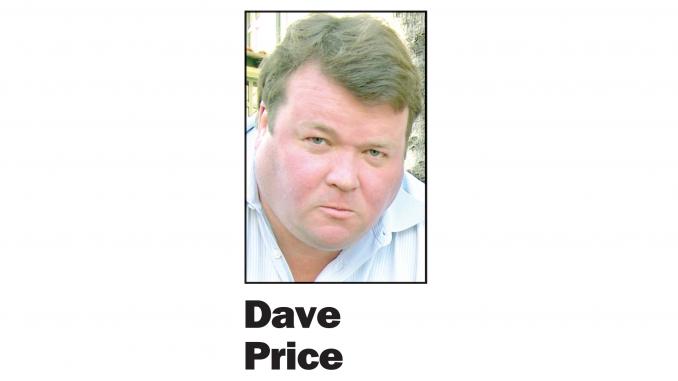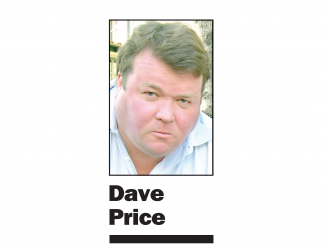
OPINION
BY DAVE PRICE
Daily Post Editor
San Carlos City Councilman Ron Collins is proposing that the city use part of its newfound $7 million surplus on 5% bonuses for city employees.
He gave two reasons: 1. Employees gave up raises and accepted benefit reductions during the Great Recession nearly a decade ago. 2. The unexpected surplus was a “team effort,” as he put it.
Good grief, where do I start?
City employees, including those in San Carlos, are well compensated, have unparalleled job security and receive benefits the private sector generally doesn’t enjoy.
For instance, AFSCME city workers get life time pensions that can range up to 81% of their top annual pay starting as early as age 55, plus lifetime health insurance.
San Carlos had six employees whose total pay and benefits last year exceeded $200,000 and 47 who topped $100,000, according to Transparent California, a nonprofit that compiles government compensation data.
On the $100,000-plus list were seven maintenance workers, two administrative assistants and four recreation coordinators.
It’s got to be nice if you’re a maintenance worker pulling down $129,827 a year in pay and benefits.
Nobody in San Carlos city government is missing a meal, that’s for sure.
And about the Great Recession, Collins should think back to what was happening in the private sector. Massive layoffs across the board. People lost their homes. The public sector generally avoided the carnage experienced by the private sector.
A ‘team effort’?
Then let’s look a little closer into his claim that the city’s $7 million surplus was a “team effort.”
Administrative Service Director Rebecca Mendenhall’s memo to the city council about the surplus doesn’t show that better job performance by city employees led to the extra money.
What happened is that property, sales and hotel tax revenues exceeded projections, spending on salaries and benefits went down because of vacancies, and “operating expenditures” fell because major projects didn’t start or were delayed.
Nowhere in her memo is any indication that city employees were more innovative or productive than they were before. No great achievements were listed that led to the surplus.
The city has simply been riding the wave of a rebounding economy.
Collins wasn’t proposing that all of the $7 million surplus would go into bonuses. Council is socking $1.2 million into a fund to cover unfunded pension liabilities. And another $4.7 million will go into “general facility and infrastructure projects,” which haven’t been listed.
That leaves about $1 million burning a hole in the council members’ pockets. And it looks like the question of bonuses will be kicked down the road to next year when the five-member council has three new faces, though Collins will be among the two who return.
I think when the city has a surplus, the first instinct of council members should be to return the excess funds to the taxpayers.
One idea would be to take the $1 million and divvy it up among the 30,499 residents, resulting in a check of $32.78 for every man, woman and child residing in the “City of Good Living.”
Another alternative is to put the money in the bank in anticipation of the next recession. In the last recession, San Carlos was so poorly run that it nearly went bankrupt. Yeah, that was a “team effort” too. The financial crisis forced the city to outsource its police and fire departments, which saves money.
Outsourcing is the kind of innovation we need more of in city government.
Tie bonuses to job performance
Frankly, handing out 5% bonuses across the board, regardless of an employee’s job performance, doesn’t accomplish anything. Except that it makes the city’s pension liability worse, since the the money paid as a bonus is included in CalPERS calcuations for pensions.
If you’re determined to give bonuses, link them to job performance and achievement. If an employee comes up with a great way to save money or solve a problem facing residents, hand that person a bonus check.
Across-the-board bonuses reward the goldbricks as well as the achievers. How does a hard working, conscientious city employees feel when the slouch in the next cubicle, who doesn’t put in any effort, gets the same bonus?
•••
Masks and banking
You’ve probably visited a bank that has a sign on the door telling customers to take off their sunglasses and hats. That’s so the surveillance cameras can get better pictures of robbers.
Now that everybody is wearing masks because of the smoke from the Butte County fire, should customers have to remove their masks when they go inside a bank? I’m wondering when we’ll see the first bank robbery committed by a person in one of those masks.
Editor Dave Price’s column appears on Mondays. His email address is [email protected].




Yet another instance of someone elected by City residents to oversee and manage public servants choosing to instead betray the residents’ interests by privileging the public servant’s interests over the residents.
This happened in Los Altos, as noted earlier by Dave Price, and it cost the Mayor his seat in the recent elections. Would that it also repeat in San Carlos and other cities where elected representatives forget their job and responsibility and instead serve the interests of those they are to oversee.
What did (and would) Councilman Ron Collins get by way of return favors from the staff whose pockets he lined up with public money? How do we find that out?
“Outsourcing” on the part of the San Carlos City Council wasn’t “innovative” thinking on the part of local government. It was a result of years of mismanagement and grandious short-sighted thinking on the part of local “leaders.
I don’t know if I’d call outsourcing “innovative” but it was certainly courageous given the death grip unions have on local government. The sad thing is that the council, when it found it had more money coming in after contracting out police and fire, didn’t reduce taxes. Now they have a huge surplus. That money needs to go back to the residents.